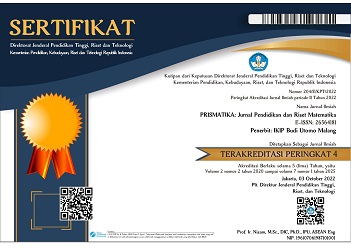PROFIL KEMAMPUAN LITERASI MATEMATIKA SISWA BERDASARKAN GAYA KOGNITIF
Abstract
This type of research used is descriptive research with a qualitative approach because the purpose of this study was to describe the profile of students ' mathematical literacy abilities based on cognitive style. This research was conducted at SMA Dr. Soetomo Surabaya in the 2022/2023 academik year. The subjects of this study were four students of X-MIPA 1 grade, namely one male FI student, one female FI student, one male FD student, and one female FD student. The research instrument was a test of students’ mathematical literacy based on PISA indicators. Mathematical literacy indicators are based on six levels of students’ mathematical literacy. Based on the analysis of the data on the results of the mathematical literacy test, it was obtained a profile description of the mathematical literacy ability of Dr. Soetomo High School namely (1) independent field students are able to work effectively with models in concrete but complex situation, present different information and relate it to real situation. Meanwhile (2) field dependent students are able to carry out the procedures well and choose and apply simple problem solving strategies and can interprete and represent situations.
References
Arikunto, S. 2010. Prosedur Penelitian Suatu Pendekatan Praktik. Jakarta: Rineka Cipta
Bem, S. L. 1981. “Gender Schema Theory: A Cognitive Account Sex Typing”. Psychological Review. Vol 88: Pp. 354-364.
Desmita. 2014. Psikologi Perkembangan Peserta Didik. Bandung: PT Remaja Rosdakarya Offset
Fakih, Mansour. 2008. Analisis Gender dan Transformasi Sosial. Yogyakarta: Pustaka Pelajar
Desmita. 2014. Psikologi Perkembangan Peserta Didik. Bandung: PT Remaja Rosdakarya Offset
Feni, M. 2021. Mengungkap Dampak Coivd-19 Pada Pelaku UMKM Kuliner (Studi Kasus: UMKM Kuliner Di Wilayah Rawamangun). 20–30. http://repository.stei.ac.id/id/eprint/4853
Fikri Apriyono 2016 Profil Kemampuan Koneksi Matematika Siswa SMP dalam Memecahkan Masalah Matematika Ditinjau dari Gender Volume 5, Nomor 2, Mei 2016 ISSN 2086 4280 IAIN Jember
Gradini, E., Firmansyah, & Saputra, E. (2021). Pengembangan Tes Literasi Matematis Menggunakan Soal PISA-Like Konteks Kultur Lokal. Jurnal Ilmiah Pendidikan Matematika AL-QALASADI, 5(1), 29–43.
Ilyas, Muhammad. 2015. Metodologi Penelitian Pendidikan Matematika. Bandung: Pustaka Ramadhan
Karmila. 2016. Deskripsi Kemampuan Literasi Matematis Siswa Di Tinjau Dari Gender. Volume 3 Nomor 1 ISSN 2502-3802 Universitas Cokroaminoto Palopo
Kusumah, Y. S. 2011. Literasi Matematis. Prosiding Seminar Nasional Pendidikan MIPA, 111. Bandar Lampung: Universitas Lampung. Press.
Ramadhoni, F. 2018. Pemenuhan Hak Warga Negara dalam Pelayanan Kesehatan di Rumah Sakit (Studi tentang perbandingan Rumah Sakit Umum Daerah Kota Malang, Rumah Sakit Islam Aisyiyah Malang, dan Rumah Sakit Panti Nirmala Malang). Universitas Muhammadiyah Malang, 27–38. https://eprints.umm.ac.id/41437/
Saputri, N. C., Sari, R. K., & Ayunda, D. 2021. Analisis Kemampuan Literasi Matematis Siswa dalam Online Learning pada Masa Pandemi Covid-19. Jurnal Pendidikan Dan Pembelajaran Terpadu (JPPT), 3(1), 15–26. https://inomatika.unmuhbabel.ac.id/index.php/inomatika/article/view/316







.png)




